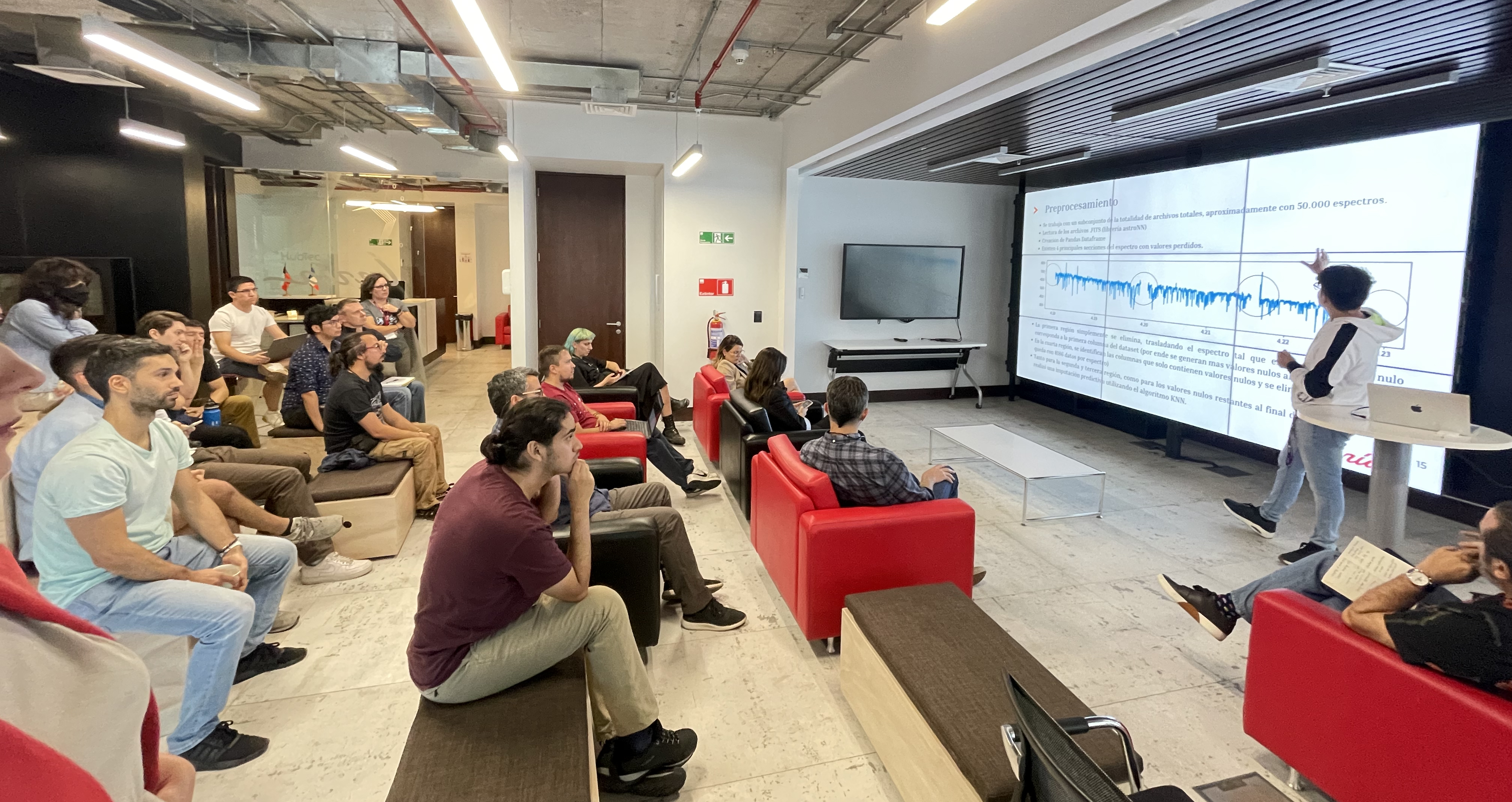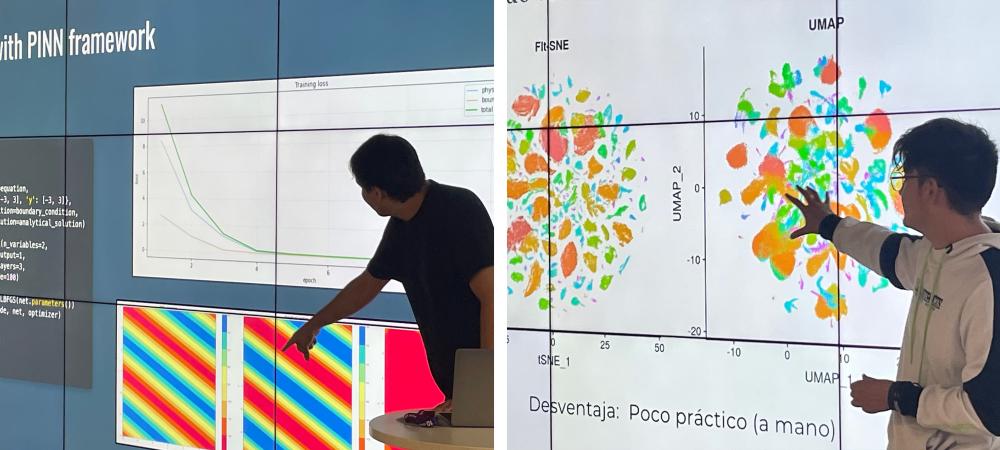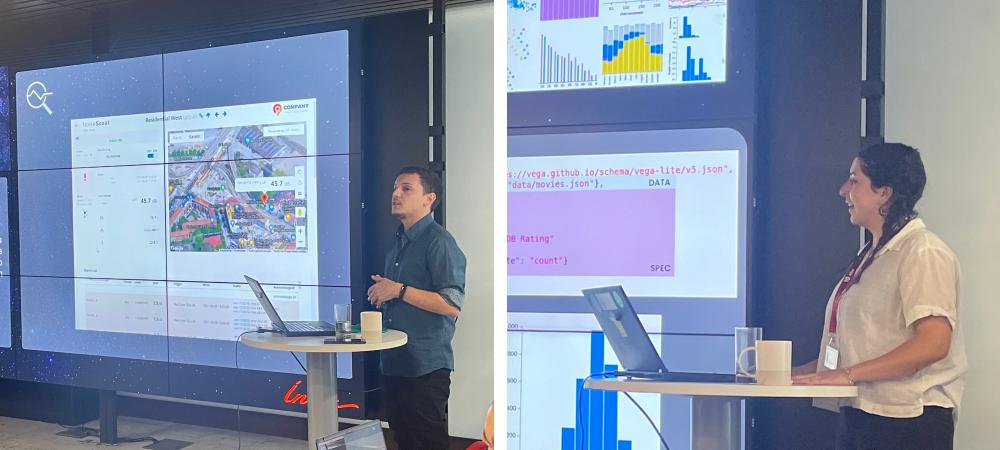
In order to strengthen the Chilean scientific-technological ecosystem by training future talents, Inria Chile carried out a new summer internship program for students from Chilean universities, which marked a milestone on February 17th with the presentation of the work of 11 students from the University of Chile, Pontifical Catholic University of Chile, and University of O'Higgins.
In total, 6 teams were formed, which had the opportunity to work together with expert researchers from Inria Chile, working on some of the center's ambitious projects.
Inria Chile valued this new internship period for the depth of the interns' work, the quality of their contributions and the excellent contributions they made to the team, demonstrating creativity, energy and fresh visions in the face of challenges.
Experience of the interns
Tomás Contreras and Álvaro Morales - students of Civil Engineering in Computer Science at the Pontifical Catholic University of Chile and Civil Electrical Engineering at the University of Chile, respectively - stood out for their project aimed at improving the robustness and ease of implementation of the IoT and AI solution for the agricultural sector, Frost Forecast, which allows visualizing, alerting and predicting the climatic state of a crop.
The team devised a series of improvements for the system of sensors and boards in charge of data acquisition, also proposing the installation of solar panels to reduce the power consumption of the solution, which are in the process of being implemented in the field.
Verbatim
The support and work of the Inria team helped us a lot, because they were open and receptive to our ideas, and also helped us to better develop everything we wanted to do. They were very supportive and the work was very collaborative with the researchers here. I would highlight the learning of teamwork in real environments, because in general in the university they give you tasks that have very defined goals and here we are developing things that perhaps have not been done before.
Student of Civil Engineering in Computer Science at the Pontifical Catholic University of Chile.
Across the board, the students highlighted the opportunity to learn about a wide range of technologies on Inria Chile's teams, where they were able to deepen their knowledge of techniques that they had not addressed in their regular studies.
"From the beginning, I noticed the prestige that Inria had and this internship exceeded all my expectations, because it is a very friendly team that is willing to teach everything that one does not know or does not have so much expertise. At the beginning I was still nervous, but little by little I loosened up thanks to the support and understanding of the supervisors. The truth is that I have learned a lot," said Alan Contreras, a student of Electrical Civil Engineering at the University of Chile.
The director of Inria Chile, Nayat Sánchez-Pi, explained that "Inria has structured a series of programs aimed at boosting the digital science ecosystem in Chile, with great emphasis on training, so we seek to support our interns so that they can access more learning opportunities and joint collaboration with top researchers".
Finally, the interns were invited to participate in the mobility program for research internships in one of the nine Inria centers in France that Inria Chile organizes each year with its Chilean partner universities, so that they can continue to deepen their scientific knowledge and their connection with the organization.
All interns and projects
- Fernando Fêtis and Diego Olguín, Civil Mathematical Engineering students at University of Chile, developed the project "Physics-informed neural networks and applications".
- Jordan Pérez, student of Electrical Civil Engineering at University of Chile, developed "Searching for perturbed dwarf galaxies using anomaly detection techniques".
- María Jesús Mellado, student of Astronomy and Civil Engineering in Computer Science at University of Chile; Roberto Maldonado, student of Civil Engineering in Computer Science at University of Chile, and Tomás Martínez, student of Civil Engineering in Computer Science at University of O'Higgins, developed "The latest from L.O.V.E.".
- Benjamín Farías, student of Civil Engineering in Computer Science at University of Chile, developed "Plankton-OOD".
- Tomás Contreras, student of Civil Engineering in Computer Science at Pontifical Catholic University of Chile, and Álvaro Morales, student of Civil Electrical Engineering at University of Chile, developed "IoT data acquisition system in Frost Forecast".
- Nicolás Isla and Alan Contreras, students of Electrical Civil Engineering at University of Chile, developed "Searching CS-AGNs with deep learning and anomaly detection techniques".


